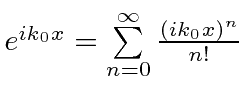- The absolute square of a wave function for a free particle is given as:
Find the expected value of  as a function of time. Find the expected
value of
as a function of time. Find the expected
value of  as a function of time. Compute the RMS x-width of this
wave packet as a function of time.
as a function of time. Compute the RMS x-width of this
wave packet as a function of time.
- Find the commutator
![$[p,e^{ik_0 x}]$](img1043.png) where
where  is a constant and the second operator can be expanded as
is a constant and the second operator can be expanded as
 .
.
- Which of the following are linear operators?
- For a free particle, the total energy operator H is given by
 .
Compute the commutators [H,x] and [H,p]. If a particle is in a
state of definite energy, what do these commutators tell you about
how well we know the particle's position and momentum?
.
Compute the commutators [H,x] and [H,p]. If a particle is in a
state of definite energy, what do these commutators tell you about
how well we know the particle's position and momentum?
- Find the commutator
![$[x,p^3]$](img1051.png) .
.
- Compute the commutator
![$[H,x^2]$](img1052.png) where
where  is the Hamiltonian for a free particle.
is the Hamiltonian for a free particle.
Jim Branson
2013-04-22

![$[p,e^{ik_0 x}]$](img1043.png) where
where  .
.




 .
Compute the commutators [H,x] and [H,p]. If a particle is in a
state of definite energy, what do these commutators tell you about
how well we know the particle's position and momentum?
.
Compute the commutators [H,x] and [H,p]. If a particle is in a
state of definite energy, what do these commutators tell you about
how well we know the particle's position and momentum?
![$[x,p^3]$](img1051.png) .
.
![$[H,x^2]$](img1052.png) where
where